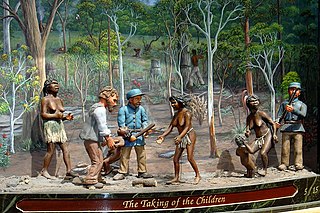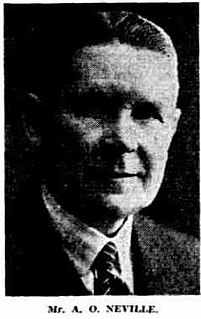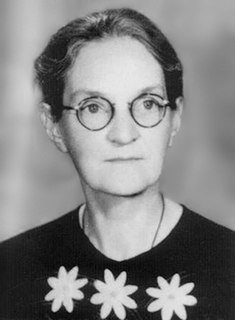Related Research Articles

The Stolen Generations were the children of Australian Aboriginal and Torres Strait Islander descent who were removed from their families by the Australian federal and state government agencies and church missions, under acts of their respective parliaments. The removals of those referred to as "half-caste" children were conducted in the period between approximately 1905 and 1967, although in some places mixed-race children were still being taken into the 1970s.
A royal commission is a major ad-hoc formal public inquiry into a defined issue in some monarchies. They have been held in the United Kingdom, Australia, Canada, New Zealand, Norway, Malaysia, Mauritius and Saudi Arabia. A royal commission is similar in function to a commission of inquiry found in other countries such as Ireland, South Africa, and regions such as Hong Kong. It has considerable powers, generally greater even than those of a judge but restricted to the terms of reference of the commission. These powers include subpoenaing witnesses, taking evidence under oath and requesting documents.

The Western Australia Police Force, colloquially WAPOL, provides police services throughout the state of Western Australia, an area of 2.5 million square kilometres, the world's largest non-federated area of jurisdiction, with a population of only 2.474 million, of which 2.14 million reside in the Perth Metropolitan Region.

Auber Octavius Neville was a British-Australian public servant, notably Chief Protector of Aborigines, in Western Australia.
The Royal Commission into Aboriginal Deaths in Custody (RCIADIC) (1987–1991), also known as the Muirhead Commission, was a Royal Commission appointed by the Australian Government in October 1987 to Federal Court judge James Henry Muirhead, QC, to study and report upon the underlying social, cultural and legal issues behind the deaths in custody of Aboriginal and Torres Strait Islander people, in the light of the high level of such deaths in the 1980s.
Western Australian Government Railways (WAGR) was the operator of railway services in the state of Western Australia between October 1890 and June 2003. Owned by the state government, it was renamed a number of times to reflect extra responsibility for tram and ferry operations that it assumed and later relinquished. Its freight operations were privatised in December 2000 with the remaining passenger operations transferred to the Public Transport Authority in July 2003.
The office of the Protector of Aborigines was established pursuant to a recommendation contained in the Report of the Parliamentary Select Committee on Aboriginal Tribes, of the House of Commons. On 31 January 1838, Lord Glenelg, Secretary of State for War and the Colonies sent Governor Gipps the report. The office of Chief Protector of Aborigines was established in some states, and in Queensland the title was Protector of Aboriginals.

The Moore River Native Settlement was the name of the now defunct Aboriginal settlement and internment camp located 135 kilometres (84 mi) north of Perth and 11 kilometres (6.8 mi) west of Mogumber in Western Australia, near the headwaters of the Moore River.

Bessie Mabel Rischbieth, was an influential and early Australian feminist and social activist. A leading or founding member of many social reform groups, such as the Women's Service Guilds, The Australian Federation of Women Voters and their periodical The Dawn, she sought to establish international campaigns for social change and human rights. She is remembered for a symbolic protest against the reclamation of Mounts Bay in 1959 when she entered the river at the age of 85 and prevented the bulldozers from commencing their work.
The history of the Aboriginal inhabitants of Western Australia has been dated as existing for 50-70 thousand years before European contact. This article only deals with documented history from non indigenous sources since European settlement in Perth.

The Forrest River massacre, or Oombulgurri massacre of June 1926, was a massacre of Indigenous Australian people by a group of law enforcement personnel and civilians in the wake of the killing of a pastoralist in the Kimberley region of Western Australia.
This is a timeline of Aboriginal history of Western Australia.
Fay Gale AO was an Australian cultural geographer and an emeritus professor. She was an advocate of equal opportunity for women and for Aboriginal people.
Henry Vincent was the first Superintendent of Rottnest Island Aboriginal Prison, in Western Australia.
An Aboriginal reserve, also called simply reserve, was a government-run settlement for Aboriginal Australians, created under various state and federal legislation. Along with missions and other institutions, they were used from the 19th century to the 1960s to keep Aboriginal people separate from the white Australian population, for various reasons perceived by the government of the day. The Aboriginal reserve laws gave governments much power over all aspects of Aboriginal people’s lives.

Mary Montgomerie Bennett (1881–1961) was an Australian activist for Indigenous justice, a teacher and advocate for Australian Aboriginal rights at a time when this was not usual amongst settler Australians.
The Royal Commission into Aged Care Quality and Safety is a royal commission established on 8 October 2018 by the Australian government pursuant to the Royal Commissions Act 1902. The Honourable Richard Tracey and Ms Lynelle Briggs were appointed as Royal Commissioners. The Commissioners were required to provide an interim report by 31 October 2019, and a final report by 30 April 2020. Tracey died of cancer in October 2019 and was replaced by Tony Pagone. The final report was tabled on 1 March 2021.
The Royal Commission into Violence, Abuse, Neglect and Exploitation of People with Disability is a royal commission established on 4 April 2019 by the Australian government pursuant to the Royal Commissions Act 1902. The Honourable Ronald Sackville, who serves as Chair of the Royal Commission, The Honourable Roslyn Atkinson, Ms Barbara Bennett, Dr Rhonda Galbally, Ms Andrea Mason, Mr Alastair McEwin, and The Honourable John Ryan currently serve as Royal Commissioners.
References
- David, Markovich (September 2003). "Genocide, a Crime of Which No Anglo-Saxon Nation Could be Guilty*". Murdoch University Electronic Journal of Law. 10 (3). Retrieved 7 May 2007.
Criticism came from other quarters as well. Rischbieth, a witness to the Moseley Royal Commission and speaking on behalf of the Australian Federation of Women Voters, criticised the assistance provided to Aborigines.[301] In rejecting the government's "neglect" justification for child removals, she asserted that "government administrators … were forcibly removing children because it was cheaper than providing the same system of support which operated for neglected white children"